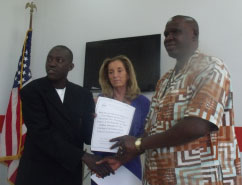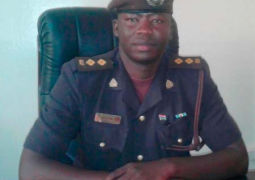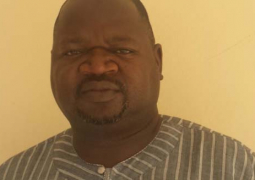
The 24th November presidential election was conducted in a generally orderly, calm and violence-free process in some areas, but irregularities were also observed in few areas though not significant, a report released yesterday by Beakanyang (Equal Opportunities for All), a registered charitable, advocacy and development youth-led organization in the country said.
Accredited by the Independent Electoral Commission, Beakanyang organization monitored and observed the presidential election across the country thanks to the US Embassy in
Speaking at a press conference held at the American Corner yesterday to hand over the report to the IEC and US Embassy, Nfamara Jawneh, Secretary General of Beakanyang and head of the observer mission, congratulated all Gambians who took part in the election to exercise their political rights.
According to Jawneh, the report was entirely based on what the association observed on the eve of Election Day, on the day itself and the day after the election.
“We observed that even though most polling stations closed on time, ballot boxes were late to be transported to counting centers; we did observe that some voters, particularly at the Buffer Zone, behind Latri Kunda Sabiji Market and at Bakoteh Bantaba polling stations, found it very difficult to locate the right polling stations to vote. They complained bitterly of staying in the queues for hours only to be redirected to another polling stream, and sometimes were redirected back to the queue they were in or to a different stream,” Jawneh said.
He added: “We also observed that ink was applied on fingers of voters, which was time consuming compared to dipping of fingers into the ink; we observed that even on Election Day, some people tried to campaign at July 22nd Square and Gambia High School, asking people to vote for their candidate (one of our observers deployed in Banjul was himself approached); and that a few counting centers were overcrowded.”
Jawneh further told the gathering, which included journalists, that their observers also saw a politician (National Assembly Member) stationed at a polling station in Sandu Misra in the Upper River Region, who was directing people to places where they should vote.
“We observed that not all parties had agents at all the polling stations; some people came to vote lately, which resulted in some argument between them and IEC officials in charge of polling stations,” he further stated.
Jawneh added that over the past six months, Beakanyang with support from the US Embassy in
“Prior to the election, Beakanyang trained a team of 15 young people, all members of the group, to serve as our election observers,” Jawneh continued.
He said on Election Day, the team members went around touring polling stations as early as 5 am, observing the voting process for at least 45 minutes in polling stations visited, before leaving for another station.
“We also witnessed the opening of polling stations and the start of voting. The Beakanyang observers also conducted interviews with assistant presiding officers and other IEC officials on the ground, as well as party agents; the team members also witnessed the closing of polls and sealing of ballot boxes. They also accompanied the transportation of ballot boxes from polling stations to counting centres,” he went on.
Noting that no attempt of double voting was reported or witnessed by members of his team, Jawneh said there were no shortage of voting materials in all the polling stations visited, and no sign of intimidation or harassment was observed or reported.
“We observed a good voter turnout, including more of young people and women,” he said, while recommending to the IEC to avoid bringing polling stations so close to each other, especially in areas where there is more than one stream.
Also speaking at the press conference was Pamela Ann White,
“My staff were also observing the elections, and I totally agree with your report. I have observed elections in
“The minor problems was the 4 O’clock closing time, which met so many people in the line and the voting time had to be extended,” she said.
Ambassador White recommend that opposition candidates be given more access to the media and for the allocation of more air-time.
Tumani Danjo, the president of Beakanyang said prior to the elections, his association embarked on a voter education campaign in the Upper River Region.
“We are happy that the voter turnout this year has increase significantly compared to the 2006 election,” he said, adding that this could be attributed to the series of voter education campaigns carried out by the IEC and partners, including Beakanyang.
Meanwhile, a copy of the report of the Beakanyang observer team was handed over to Joseph Colley, Director of Communications at the IEC, and to US Ambassador Pamela Ann White.



